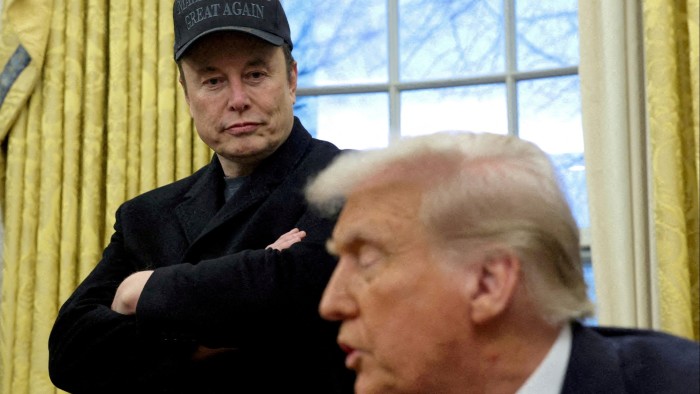ECB expected to cut rates in April and June as tariffs threaten recession
The ECB is highly likely to cut borrowing costs next week and again in June, investors and economists believe, as Donald Trump’s sweeping tariffs risk pushing the bloc into recession.
Investors are pricing in a 90 per cent likelihood of a quarter-point cut in interest rates at the next ECB rate-setting meeting on April 17, according to Bloomberg data, up from 70 per cent before Trump’s so-called “liberation day” tariff announcements on April 2. They expect two further cuts by the end of this year, with the chance of a third.
A quarter-point cut in April, which would be the seventh consecutive reduction, and another in June “have really become a no-brainer,” said Frederik Ducrozet, head of macro research at Pictet Wealth Management, who said any other decision would be “a disaster”.
He said the key question was whether the outlook could become so dire that the ECB would be forced to shift to larger cuts to stimulate the economy or to offer liquidity backstops.
Greek central bank governor Yannis Stournaras — one of 26 people with a vote in the ECB’s governing council — warned in an interview with the Financial Times that the looming trade war would expose the currency bloc to a large “negative demand shock” that would create significant deflationary pressures.
Global equity markets slumped for the third day running on Monday while the oil price plunged to levels not seen in four years, reflecting concerns about a global recession, while the euro strengthened.
“Growth has suddenly become the key problem around the world, and that includes Europe,” said Mahmood Pradhan, global head of macro at Amundi Asset Management. “That will outweigh concerns about inflation, which is more an issue in the US. That points to policy easing in Europe.”
The new sentiment marks a drastic change from more hawkish expectations after the ECB’s quarter-point rate cut in March.
At that time rate-setters in Frankfurt paved the way for a potential halt in cuts in April, stressing that monetary policy had become “meaningfully less restrictive”.
But Trump’s tariff announcement has darkened the outlook as well as roiling markets. The 20 per cent universal tariffs that the US said it would impose on EU imports could lead to €750bn of economic damage for the euro area over Trump’s full four-year term, the Cologne Institute for Economic Research has estimated.
Many analysts warned that the hit from the looming trade war to euro-area growth would far exceed any potential inflationary threats.
“The slowdown in the real economy, lower energy prices and stronger euro should help speed up disinflation in Europe,” said Gilles Moëc, group chief economist at Axa Investment Managers.
Economists have also warned that Chinese manufacturers, which face even higher import duties, may dump their goods on European markets instead, potentially generating a disinflationary shock.
In a particularly bearish forecast, Barclays economists predicted the ECB would slash interest rates by half from 2.5 per cent to just 1.25 per cent in October and would return to unconventional monetary policy measures such as bond-buying in the second half.
Barclays forecast the euro area would plunge into a recession in the second quarter that would last until the end of 2025.
Inflation in the Eurozone fell to an annual 2.2 per cent in March, close to the ECB’s two per cent medium-term target, but the Bank of England has been grappling with stickier inflation.
In the UK, consumer prices rose an annual 2.8 per cent in February. Wage growth has also remained robust despite the weak state of the UK economy, running at 5.9 per cent in the three months to January.
But economists still expect the UK to be hit by the same forces that are forecast to drive the ECB to reduce rates next week, meaning traders are pricing in another quarter-point BoE rate reduction at its next policy announcement on May 8.
Chancellor Rachel Reeves has warned that even if the UK manages to strike a trade deal with Trump, the UK will be weighed down by the wider global deceleration likely to result from the trade war.
The UK’s decision so far not to retaliate for US levies could mitigate the inflationary impact of the trade hostilities, said James Smith, UK economist at ING.
“If anything, it could prove deflationary further down the line as economic growth cools and the threat of dumping from other big global producers rises,” he said. “We expect the Bank to continue cutting rates once per quarter for the rest of this year.”
Financial markets are fully pricing in a BoE rate reduction at its next policy meeting from the current level of 4.5 per cent. Altogether they are pricing more than three cuts this year.
Last month Andrew Bailey, BoE governor, warned of the increasing risks facing the UK as a result of US tariffs. The direct impact on inflation was “ambiguous”, he told a committee of MPs, but “the risks to the UK economy — and indeed the world economy — are substantial”.
“The UK will not be unscathed just because it has been subject to slightly lighter tariffs than the EU — the hit to the global economy will impact the UK just as much,” said Pradhan.
Data visualisation by Janina Conboye







